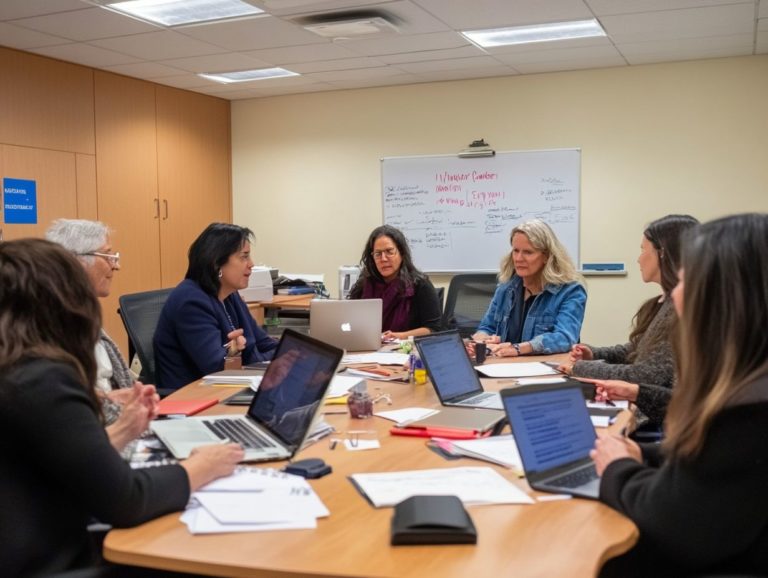Best Practices for Attending an Accredited University
Choosing the right university is a critical step in shaping your future. Grasping best practices can truly make a significant impact.
This guide will help you navigate essential factors to consider when selecting an accredited institution, preparing for university life, and managing your finances effectively. You ll explore how to build a robust support network, use strategies for academic success, leverage university resources, and maintain your mental and physical well-being.
You will also discover networking opportunities that can lay the groundwork for your professional journey. Get ready to embark on a transformative educational experience!
Contents
- Key Takeaways:
- Choosing an Accredited University
- Preparing for University Life
- Managing Finances
- Building a Support Network
- Academic Success Strategies
- Time Management and Study Techniques
- Utilizing University Resources
- Career Services, Counseling, and Tutoring
- Maintaining Mental and Physical Health
- Self-Care and Coping Strategies
- Networking and Building Professional Relationships
Key Takeaways:

Choose an accredited university based on factors such as program offerings, location, and reputation.
Be academically and personally prepared for university by developing time management skills and seeking support from resources and communities.
Explore scholarship and financial aid options, utilize career services and counseling, and prioritize self-care to maintain mental and physical health while attending an accredited university.
Choosing an Accredited University
Choosing an accredited university is crucial for your education. It ensures the institution is legitimate and opens doors to quality education and financial aid.
Accreditation is a benchmark for educational standards. Understanding the different types of accreditation, both institutional and programmatic, helps you make informed choices about your education.
Institutions accredited by recognized agencies like the Council for Higher Education Accreditation (CHEA) or the U.S. Department of Education typically offer advantages such as better transfer credits and enhanced employer recognition.
Factors to Consider
When selecting an accredited university, it’s essential to weigh the top factors in choosing that will directly shape your educational journey and future prospects.
The qualifications and expertise of faculty members are paramount. Their background in both academia and industry can greatly enhance your learning experience.
Programmatic accreditation ensures that the curriculum adheres to established standards, validating the quality of education you ll receive.
Diverse recruitment practices contribute to a vibrant campus culture, offering you broader perspectives. All these elements profoundly impact student outcomes and career readiness.
Preparing for University Life
Preparing for university life extends beyond academic readiness; it involves personal growth, social adaptability, and a solid grasp of institutional expectations.
Successfully integrating into higher education demands that you cultivate essential skills, explore distance education options, and engage in meaningful self-reflection. It s vital to assess your readiness for both academic rigor and personal challenges.
Recognizing the resources available at accredited universities can greatly enhance your preparedness for this exciting new chapter.
Academic and Personal Readiness

Achieving both academic and personal readiness is essential for your success in university, particularly in rigorous fields like nursing education or vocational training.
Developing effective study skills and mastering time management will enhance your ability to thrive. This involves not just organizing your coursework but also understanding your unique learning style. Tailoring your study methods to align with your strengths is crucial.
Emotional intelligence is vital for navigating the challenges of higher education. By cultivating resilience, you’ll be better equipped to handle stress, maintain motivation, and embrace constructive feedback all critical for personal growth and academic excellence in your chosen field.
Managing Finances
Managing your finances while attending university is crucial for financial stability. It ensures a successful educational journey. Understanding the ins and outs of financial aid options is an essential skill in your toolkit.
Scholarships, grants, and student loans can significantly lighten the load of educational expenses. This is especially true at accredited institutions that meet financial aid eligibility criteria. By exploring various funding sources, you can make informed decisions and craft a strategic financial plan for your future.
Effective financial management enhances your academic performance and minimizes stress during those transformative college years.
Scholarship and Financial Aid Options
Scholarship and financial aid options are vital resources for students seeking to fund their education without accumulating excessive debt. These opportunities cater to your diverse needs and talents.
- Merit-based scholarships reward you for your academic or extracurricular achievements, helping high achievers ease their tuition burden.
- Need-based scholarships aim to alleviate financial stress for those demonstrating economic hardship, ensuring that financial limitations don’t hinder your educational aspirations.
- Many colleges also offer departmental awards, recognizing excellence in specific fields of study.
In addition to institutional offerings, federal and state financial aid programs play a crucial role in supporting your journey. Accredited colleges typically provide substantial financial aid packages, maximizing your access to higher education.
Building a Support Network
A strong support network can transform your university experience! It enhances both your academic and personal life through shared resources and vibrant communities.
Engaging with faculty members and connecting with your peers allows you to tap into invaluable guidance and encouragement during challenging times. Participating in study groups and using the support services offered by accredited institutions will significantly enrich your educational journey.
Grasping the peer review process, where students review each other’s work, will deepen your appreciation for collaborative learning and research. This knowledge empowers you to thrive in your academic endeavors.
Resources and Communities for Students

University resources and communities are essential in supporting you, offering access to academic assistance and a vibrant network of peers. These elements are vital for creating an environment that fosters both learning and personal growth.
Tutoring centers provide specialized help in various subjects. This enables you to grasp challenging concepts and boost your academic performance. Academic advising acts as a guiding force, helping you navigate your educational path while empowering you to make informed decisions about your courses and career aspirations.
Peer mentoring programs cultivate supportive relationships and promote collaboration and community engagement. This allows you to share experiences and insights with fellow students.
This multifaceted approach ensures you have all the necessary tools to thrive on your educational journey!
Academic Success Strategies
Implementing effective academic success strategies is vital for thriving in demanding environments like nursing programs and other degree pursuits. This enables you to maximize your educational practices.
Successful strategies encompass various elements, including time management, effective study techniques, and active learning engagement. By crafting a structured academic plan and utilizing available resources, you can significantly enhance your learning outcomes and deepen your understanding of your subjects.
Prioritizing these strategies helps you achieve your academic goals and contributes to your overall personal growth.
Act now to explore scholarship options and lighten your financial load!
Time Management and Study Techniques
Time management and effective study techniques are essential for academic success in university.
By using strategies like the Pomodoro technique, which involves focused work bursts followed by short breaks, you can enhance your study sessions. Prioritizing tasks based on urgency and importance is also key.
Recognizing your learning style visual, auditory, or kinesthetic can help you choose the best study methods. For instance, visual learners might benefit from diagrams, while auditory learners may prefer group discussions or podcasts.
These strategies boost retention and make learning enjoyable.
Utilizing University Resources
Using university resources can significantly enhance your academic experience. Services like career guidance, counseling, and tutoring provide essential support.
Tapping into these resources empowers you to tackle academic challenges and build skills for your future career. Knowing how to navigate these services is a game-changer for your success.
Career Services, Counseling, and Tutoring

Career services, counseling, and tutoring are key university resources for academic success. These services enrich your education and set the stage for your career.
Career services help with job placement and networking opportunities. Counseling offers mental health support to help manage academic pressures and personal challenges.
Tutoring provides personalized help in various subjects, ensuring you grasp challenging concepts. Together, these resources create a supportive environment for your academic and personal growth.
Maintaining Mental and Physical Health
Keeping both mental and physical health in check is vital while navigating university life. This balance directly affects your performance and well-being.
Establishing self-care routines and stress management techniques can help build resilience. Engaging with mental health services and wellness programs offers invaluable support.
By taking a proactive approach to health management, you enhance both your academic experience and personal fulfillment.
Self-Care and Coping Strategies
Implementing self-care techniques is vital for maintaining mental health during university years. Establishing a routine with mindfulness, regular exercise, and relaxation improves overall well-being.
Mindfulness helps you stay present and reduces anxiety. Physical activity boosts mood and enhances sleep, which are critical for academic success.
Set aside time for relaxation through reading, meditation, or enjoying nature. These techniques create a balanced approach, allowing you to excel academically while prioritizing your mental health.
Networking and Building Professional Relationships
Networking and building professional relationships during your university years is vital for achieving future career success, providing you with invaluable opportunities for mentorship and collaboration.
Engaging with peers, faculty, and industry professionals can greatly enhance your degree’s value and boost your career prospects! Career services can help you establish contacts and hone the skills essential in today s competitive job market.
The relationships you forge during this pivotal time can open doors to internships, job placements, and lasting career benefits.
Opportunities for Networking and Mentorship
Opportunities for networking and mentorship abound during your time at university, offering valuable pathways for professional connections and career development.
These experiences enable you to engage with industry professionals and fellow peers, creating an environment where meaningful relationships can thrive.
Events like career fairs, alumni networking gatherings, and specialized club meetings facilitate the exchange of knowledge and open doors to internships and job placements.
Mentorship programs further enrich this journey by pairing you with seasoned professionals who can guide you through the challenges of your career path.
By immersing yourself in these initiatives, you can significantly expand your horizons, gain insights into various fields, and grasp essential industry trends ultimately setting the stage for your future success.
Frequently Asked Questions
- What are the benefits of attending an accredited university? Attending an accredited university ensures quality education recognized by employers, enhancing your career opportunities.
- How can I check a university’s accreditation? You can check the accreditation status of a university by visiting the website of the accrediting agency or by contacting them directly. You can also search for the university on the U.S. Department of Education’s Database of Accredited Postsecondary Institutions and Programs.
- What are some best practices for choosing an accredited university? Best practices include researching the accreditation status, considering program options, evaluating costs and financial aid, and reviewing the university’s reputation and student satisfaction.
- Can I transfer credits from an accredited university to another university? In most cases, credits from an accredited university can be transferred, but it’s important to confirm with the receiving university to ensure acceptance.
- What best practices should I follow for online programs at accredited universities? Research the accreditation of both the university and the specific program, review available technology and resources, and read reviews from current or past students.
- What are some best practices for succeeding at an accredited university? Stay organized, manage your time effectively, actively participate in class, seek help when needed, and take advantage of university resources and opportunities.






